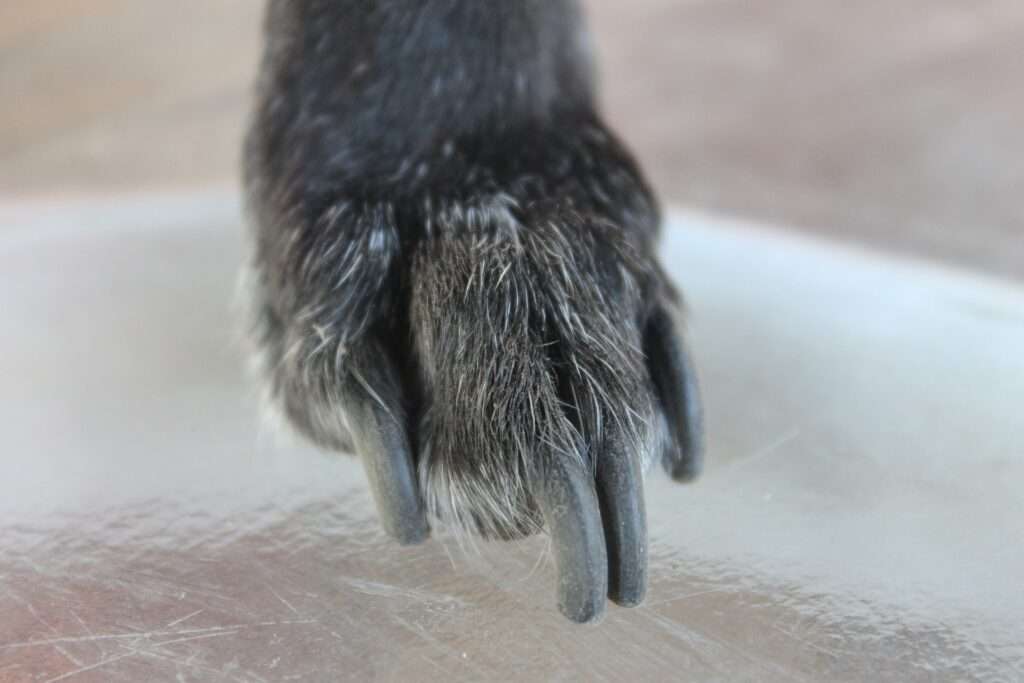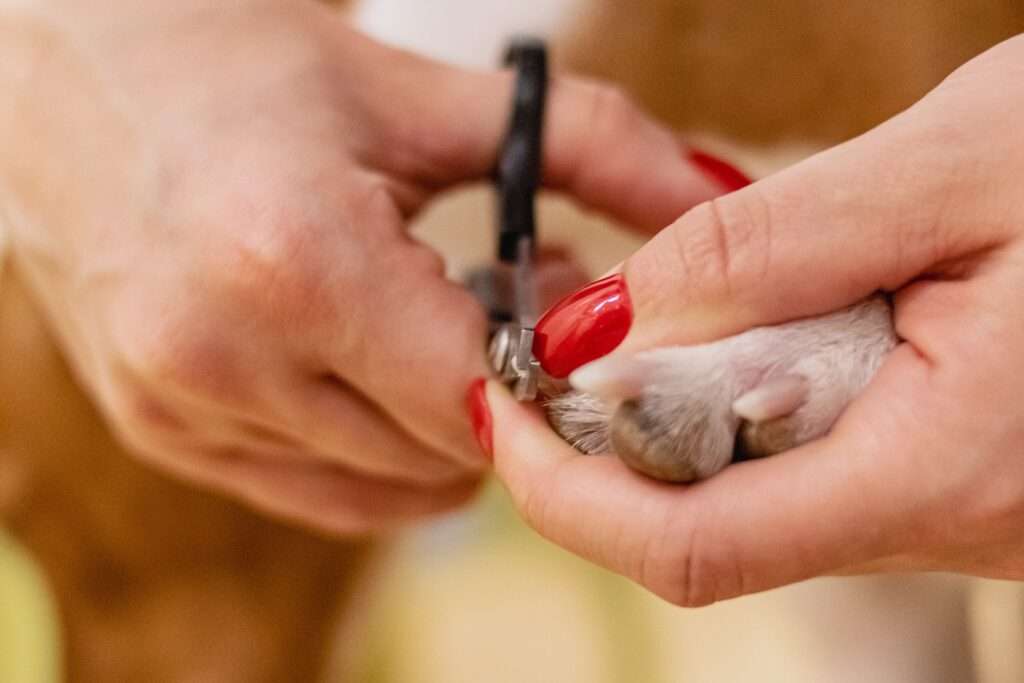6 Expert Tips to Stop Dog Biting Nails
As a responsible dog owner, it is important to closely monitor your furry companion’s overall health and well-being, which includes paying attention to their nail health. While it may seem like a small aspect of your dog’s care, nails that are too long or infected can cause pain, discomfort, and even permanent damage.
One common issue that many dog owners face is nail biting, which can be a sign of underlying problems. In this article, we’ll take a closer look at dog nail biting, including its causes and how to prevent it.
Understanding Dog Nail Anatomy
Prior to delving into the causes of nail biting in dogs, it is important to have a basic understanding of the anatomy of dog nails. A dog’s nail is composed of several layers, including the hard outer layer called the nail plate, the soft quick, and the bone and blood vessels underneath.
Nails grow from the base of the nail bed and continue to grow throughout a dog’s life, although growth may slow down as they age. The type of nail a dog has can vary depending on their breed, with some having curved nails while others have straight ones.
Understanding the structure and growth of your dog’s nails can help you better care for them and prevent issues such as overgrowth or infection.
Common Dog Nail Problems

While nail biting is one issue that dog owners may face, there are other common nail problems to be aware of. Overgrown nails, for example, can cause discomfort and even affect your dog’s gait. Broken nails can be painful and may require veterinary attention.
Ingrown nails, where the nail grows into the paw pad, can also cause pain and may require intervention. Infected nails can be caused by bacteria or fungus and can lead to pain and swelling. Split nails can occur for a variety of reasons and can be quite painful.
To avoid any further complications, it is crucial for dog owners to monitor their dog’s nails regularly and promptly address any issues that arise.
Causes of Dog Nail Biting
Nail biting is a common behavior in dogs that can indicate underlying issues. There are several potential causes of nail biting, including medical issues and behavioral issues.
Medical issues such as allergies, skin infections, and painful joints or bones can cause dogs to bite their nails as a way to alleviate discomfort. Behavioral issues such as boredom, anxiety, and habitual biting can also lead to nail biting.
It’s also possible for nail biting to be a learned behavior, where a dog learns to bite their nails as a way to get attention or treats. Understanding the root cause of your dog’s nail biting can help you address the issue and prevent further complications.
Expert Tips to Stop Dog Biting Nails
Dog biting nails can be a frustrating and potentially harmful behavior for pet owners to deal with. Fortunately, there are several expert tips that can help prevent and stop this issue. From providing chew toys to managing stress and anxiety, these tips can help keep your dog’s nails healthy and prevent nail biting in the future.
- Provide your dog with chew toys or bones. Giving your dog something to chew on can help redirect their biting behavior away from their nails. Choose durable chew toys or bones that are safe for your dog to chew on and supervise them while they chew.
- Trim your dog’s nails regularly. Keeping your dog’s nails trimmed and filed can prevent discomfort or injury that may lead to nail biting. Use specialized dog nail clippers or seek the help of a professional groomer or veterinarian.
- Address any underlying medical issues. If your dog’s nail biting is due to a medical issue like allergies or skin infections, seek the help of a veterinarian to diagnose and treat the underlying issue.
- Train your dog to stop biting their nails. Using positive reinforcement, train your dog to stop biting their nails by offering them a chew toy or treat when they start to bite their nails, and praising them when they chew on the toy instead.
- Manage your dog’s stress and anxiety. If your dog’s nail biting is due to stress or anxiety, try to identify and manage the underlying cause. Provide your dog with a safe and comfortable environment, offer them plenty of exercise and mental stimulation, and consider using calming aids like pheromone sprays or essential oils.
- Reward good behavior. When your dog stops biting their nails, reward them with praise, treats, or playtime. Consistency and positive reinforcement can help reinforce good behavior and prevent nail biting in the future.
Remember, every dog is different, and what works for one dog may not work for another. Be patient and persistent, and seek the help of a professional if you need additional guidance.
Tips for Maintaining Your Dog’s Nail Health

In addition to addressing nail biting, it’s important to maintain your dog’s overall nail health. Regular nail trimming is crucial to prevent overgrowth and splitting, and should be done every 2-3 weeks for most dogs.
You can use a specialized nail clipper or grinder, or take your dog to a professional groomer or vet for trimming. It’s also important to check your dog’s nails regularly for signs of infection or other issues, and to keep them clean and dry.
Providing your dog with a healthy diet and regular exercise can also contribute to strong, healthy nails. By taking a proactive approach to your dog’s nail care, you can help prevent issues and keep your pup happy and comfortable.
Conclusion
Dog nail biting may seem like a minor issue, but it can actually indicate underlying health or behavioral problems. By understanding the anatomy of dog nails, common nail problems, and the causes of nail biting, you can keep your dog’s nails healthy by addressing any issues promptly which will help them stay comfortable and content. Take the necessary steps to maintain their nail health with the right care and attention.
Frequently Asked Questions
Q: Why do dogs bite their nails?
A: Dogs may bite their nails for various reasons, including medical issues like allergies, skin infections, and painful joints or bones, as well as behavioral issues like anxiety, boredom, or stress.
Q: What can I do to prevent my dog from biting their nails?
A: To prevent your dog from biting their nails, you can try providing them with chew toys or bones to redirect their chewing behavior, keeping their nails trimmed and filed regularly to prevent discomfort or injury, and addressing any underlying medical or behavioral issues with the help of a veterinarian.
Q: Is it normal for dogs to bite their nails?
A: Occasional nail biting is normal for dogs, but excessive or persistent nail biting can be a sign of an underlying problem that should be addressed.
Q: Can nail biting lead to health problems for my dog?
A: Yes, excessive nail biting can lead to a number of health problems for dogs, including infections, inflammation, and even permanent damage to the nail bed. It’s important to address the behavior as soon as possible to prevent these complications.
Q: How can I maintain my dog’s nail health?
A: Regular nail trimming, providing your dog with a healthy diet and plenty of exercise, and addressing any underlying medical issues can all help to maintain your dog’s nail health.
Q: How can I tell if my dog is biting their nails due to a medical issue?
A: If your dog is biting their nails excessively or constantly, it may be a sign of a medical issue. Other signs to look out for include redness, swelling, or discharge around the nail area, limping or favoring a paw, and changes in your dog’s behavior or appetite.
Q: Can I use human nail clippers to trim my dog’s nails?
A: It is not recommended to use human nail clippers to trim your dog’s nails, as they may not be strong or sharp enough to cut through the tough nails of a dog. Instead, use specialized dog nail clippers or seek the help of a professional groomer or veterinarian.
Q: How often should I trim my dog’s nails?
A: The frequency of nail trimming depends on the individual dog and their lifestyle. Generally, dogs that walk on hard surfaces like pavement may need less frequent trimming than those who walk on soft surfaces like grass. Check your dog’s nails regularly and trim them when they start to touch the ground.
Q: Can I train my dog to stop biting their nails?
A: Yes, you can train your dog to stop biting their nails by redirecting their behavior with positive reinforcement. Offer them a chew toy or treat when they start to bite their nails, and praise them when they chew on the toy instead. Consistency and patience are key to successful training.
Q: Are there any natural remedies I can use to prevent my dog from biting their nails?
A: Yes, there are some natural remedies that may help prevent dog nail biting, such as providing your dog with a balanced diet, adding supplements like omega-3 fatty acids or probiotics to their diet, and using essential oils like lavender or chamomile to calm them down.
Additional Resources
If you’re looking for more information on dog nail care, there are many resources available to help. Here are a few to get you started:
- Dr. Marty’s article on the meaning behind your dog biting nails: https://drmartypets.com/dog-biting-nails/
- The American Kennel Club’s guide to dog nail care: https://www.akc.org/expert-advice/health/how-to-trim-dogs-nails-safely/
- VCA Animal Hospitals’ first aid tips for broken nails in dogs: https://vcahospitals.com/know-your-pet/first-aid-for-broken-nails-in-dogs
By staying informed and taking proactive steps to care for your dog’s nails, you can help keep them healthy and happy for years to come.




